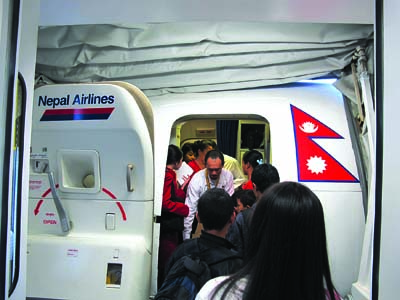To plot the trajectory of the downfall of Nepal Airlines, you have to go back to the 1990 pro-democracy movement. People power may have been good for the country, but it spelt disaster for the airline. The two main political parties of the time competed to milk the cash cow until it ran dry.
 KUNDA DIXIT |
Nepali Congress was in power for longer, so it had more time for mischief. Corruption, mismanagement and interference destroyed a once proud airline that was known for its viable international service that subsidised domestic air travel.
The list of scandals is long, but three stand out: the Lauda Air lease, the Dhamija scam, and the unfortunate sale of two perfectly good fully depreciated 727s that we hear are still flying in South Africa. UML learnt from NC and tried to get kickbacks on later aircraft deals as well. It got to a point where politicians, when they couldn't pocket kickbacks from inflated purchase prices, started skimming off the over-invoiced hourly lease rate of jets. Obsolete aircraft like 737-100s were leased just because the payoffs to politicians were heftier.
Today, the pickings have become so slim and the greed so insatiable that politicians and their appointees in the airline try to cheat even on engine maintenance contracts and other purchases. Just this month, someone actually stole the Fly Away Kit that always has to be on board a 757.
Nepal's flagship, which once had four jets and 11 Twin Otters, now has just two 757s and three airworthy Twin Otters, and even these are grounded most of the time. The four million Nepalis who work in India, the Gulf, Malaysia, Korea and Japan have to use the airlines of other countries to come home. While Qatar Airways has 21 flights a week between Kathmandu and Doha, Nepal Airlines can barely manage two to service the half a million Nepalis who live in Qatar. Nepal Airlines would be viable if it did nothing else but just flew Nepali workers back and forth. But because the airline was never allowed to grow and respond to that demand, Nepali passengers have to pay premium tariffs to foreign airlines. Most of the money our workers save through their blood and sweat doesn't even stay here with a Nepali airline. What could be more tragic than that?
Every time the airline has tried to add aircraft to respond to passenger demand, vultures have moved in to scuttle the deal. The current debacle over the Airbus purchase is a case in point. The Europeans removed middlemen, and offered a package deal on a 330 and 320 for 16 per cent off the rack price. What did we do? We hauled the CEO off to jail for transferring Airbus Industrie an advance for the two jets as per contract.
If the deal had gone through, Nepal Airlines would by now be flying 320s on our India and Thailand routes, and the 330 for the Gulf, Malaysia and Japan. It would have been a big boost to NTY 2011. But we bungled it, and even if we decide to revive the deal now it will cost us Rs 2 billion more, not counting the opportunity cost.
To be sure, it is not just the politicians to blame. Nepal Airlines management has allowed itself to be manipulated and divided by political factions in government. The internal polarisation in the airline today reflects the country's political polarisation.
Look at how the private domestic airlines in Nepal have grown and prospered and see what we could do if the politicians left us alone. We need a CEO who is not the puppet of the minister of the moment.
Domestic private airlines pay Rs 600,000 per month to a captain, but the allowances and salary of a jet captain on NAC is barely Rs 130,000. Experienced NAC captains are now flying for foreign carriers and earning $10,000 a month. The crew exodus is now so serious that even if the airline buys new planes, there will be no one to fly them.
People ask me why I still stick with Nepal Airlines. I reply that I will only quit when it is flying high again, or when it has to close down.
When I joined Nepal Airlines in 1988 I made a silent promise to myself that I would proudly wear my uniform and fly my country's flag around the world. There are many motivated staff like me in Nepal Airlines: pilots, flight attendants, managers, ground staff. And that is what gives me hope for the future of Nepal Airlines.
Vijay Lama has been flying Twin Otters and Boeing 757s for Nepal Airlines for the last 24 years.
Read also
Dysfunction, Inc., PRASHANT JHA



